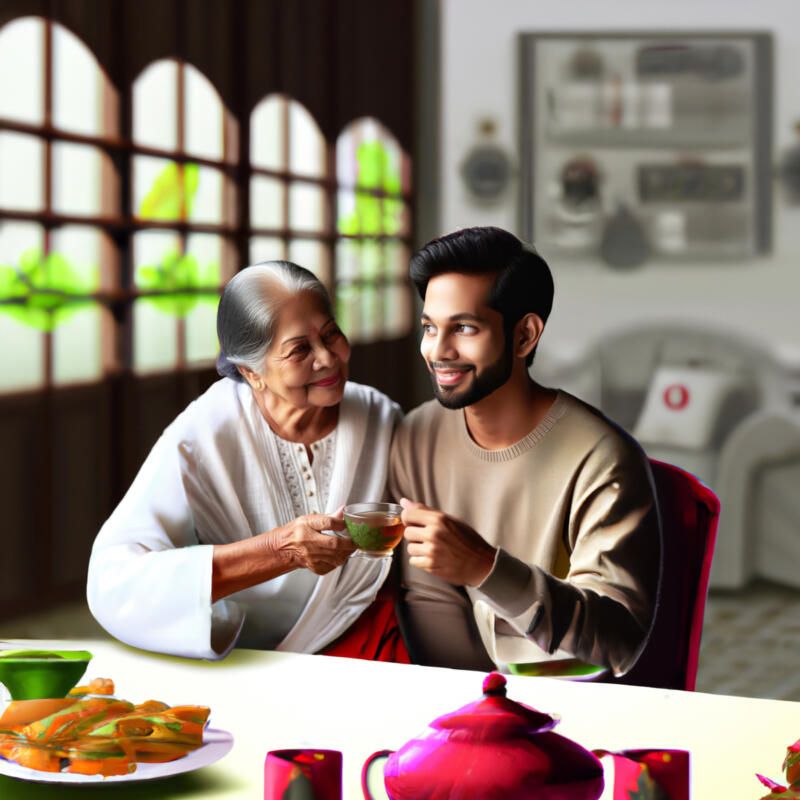Not Just Giving Care, It’s Being CARE: Compassionate, Affectionate, Responsible, Empathetic
Becoming caregivers has become more prevalent within our Gen-Z community. Whether it is due to living in a multigenerational household or having a meaningful career, caring for the elders or someone with a disability has become an integral part of our pursuit of becoming better humans. Discussing this with my friends, I realized that we all had shared experiences as caregivers for our loved ones. A Gen-Z working professional shares his experience of being a personal caregiver for his healthy 70-year-old maternal grandma and also reflects on his experience as a teenager when his paternal grandma needed caregiving. I also engaged in an insightful dialogue with a Gen-Z in-home care provider who reflects on being a caregiver as a professional.
For many of us in our twenties, we are just starting our careers and are on a mission to become the ultimate superhuman. Our health and “minor” issues take a backbench. We overwork ourselves so that we have some stability as we age. We are considered to be in our best mental and physical shape, making us an expendable resource to our family and friends. Some of us living in multigenerational households take on additional responsibilities as we live with our aging parents and grandparents – caregiving.
In recent conversations with close friends, I had the opportunity to learn and connect on shared experiences being caregivers. Having experience of my own, I related to my friend’s experience living in a multigenerational South Asian household. Whether as a registered professional or a family member, caregiving stems from love.
The Family Member-Turned Caregiver
Sami Malik is a South Asian Gen-Z working full-time as a Business Development Representative in a Supply Chain Management company. For him, caregiving is all about giving back and taking care of a loved one. Sami started the conversation by sharing his day-to-day experience with his maternal grandmother in the present day.
Sami has an in-office job that requires him to be present every day. He lives with his maternal grandma and his parents. Sami is very thankful that his grandma is very healthy and self-sufficient for a 70-year-old. She follows a routine, is very positive, and very calm. Sami helps her with tasks that come under the responsibilities of a caregiver. Sami primarily takes her to medical appointments and ensures she is getting proper medical care. He also assists his maternal grandmother in cooking meals and lifts items too heavy for her. Sami and his parents strive to make sure that his maternal grandmother ages gracefully and comfortably. It seems Sami and his family have it easy as caregivers now. A few years ago, the story was a little different.
Sami shared the story of his paternal grandma requiring more care over the years. Sami, now 24, was 19 when his paternal grandmother passed away. Reflecting on his experience then, Sami shared that taking care of his paternal grandmother was a team effort. His parents, his siblings, and he would focus on keeping his paternal grandmother busy and comfortable. Dealing with cancer, Sami’s paternal grandma’s health deteriorated rapidly. As Sami was in his teens/pre-teens and a full-time student, his parents were the active caregivers for the paternal grandma. From transportation needs to day-to-day chores, the family would take her to countless medical appointments, help her get around the house, and take care of her meals and medications, amongst other things. For Sami, she was like a second mother in the house. Sami recalls that there were times when his paternal grandma would fall and would be unable to get down the steps of their home. He noticed that she was more prone to injuries. Sami remembers lifting his paternal grandma and assisting her through basic movements.
Sami says education and communication were imperative to navigate such medical conditions. Sami and his parents would spend time educating his paternal grandma on her medical conditions and would engage with her daily. Keeping her active and occupied through various senior-focused activities also helped Sami’s paternal grandma to live through the illness.
Reflecting on the overall experience, Sami didn’t see caregiving as a hindrance. For him, it was about taking care of his loved ones. As a teenager, he didn’t realize that his paternal grandma would pass so soon or that she would need significant care early. It made him think about what would happen to him if or when he ever ends up in a similar situation.
“When I get old, who is going to be there for me?”
Based on his experience as a caregiver, he often thinks about whether he wants a professional caregiver or his close loved ones to take care of him if or when he requires it.
“Confessions” of a Professional Caregiver
From a professional caregiver’s perspective, caregiving is more than just a profession. It is about providing support to individuals and having a positive impact on the person they are caring for.
A challenging profession, caregiving requires a unique set of skills and qualities. Patience, compassion, and empathy are vital in providing emotional support and physical care for patients.
In a conversation with a professional Gen-Z in-home caregiver, Lucy (not her real name) shares insights into her day-to-day role as an in-home caregiver. In the following interview, she highlights the importance of adapting to the changing needs of their clients and providing personalized care that meets their needs. Setting goals, understanding boundaries, and having transparent communication was key for Lucy to feel accomplished as a professional caregiver.
The Interview
Q: What is a day in the life of a home healthcare provider like?
A: I’m an in-home caregiver for those with developmental disabilities. I typically start the day by arriving at the client’s home and discussing anything important about the client with the previous working caregiver. Then, the client and I will discuss any plans or goals they made for that day and strive to accomplish them. It can range from any outdoor activities and/or doing anything indoors, like chores. Throughout the day, I will assist them whenever they ask or need assistance due to their disability. At the end of the day, I will ask how their day went and discuss anything on their minds. Then the night staff usually will assist them with their night routine. I try leaving on a good note with every client.
Q: What are the challenges and rewards of this work?
A: A challenge: I had a lot of difficulty understanding boundaries, whether they are verbal or non-verbal. Communication is key to me, however I learned that giving the individual some space can help a lot.
The biggest reward I value so much is the trusting relationships I’ve built between clients and their families. There’s a deep sense of gratitude from everybody involved.
Q: What motivates you as a caregiver?
A: I can make the slightest or biggest difference in my client’s life. My goal is to assist my clients in accomplishing any goals they have for the day. Every shift, I look forward to connecting with my client, knowing there’s a positive impact made for both of us.
Q: How is your profession viewed by your family and community?
A: My family and community are proud of what I do and have encouraged me to keep being a caregiver. They never thought I’d do something in the caregiving space, however, they’ve supported me ever since I started it.
At the end of the day, caregiving comes down to one thing – taking care of humans. Aging is a natural part of life. Disability is a part of our human species. It can happen to anyone at any time. Caregivers are selfless and kind individuals who are focused on having a positive impact on the person they are caring for. It is a noble responsibility that comes with its own set of challenges and rewards.
Our aging loved ones need or will need our support and care, and we must ensure that they age with grace and dignity. As we navigate our careers and personal lives, let us not forget the importance of caregiving and the impact it has on our loved ones and our society. Remember, it is about putting yourself in the patient’s shoes and understanding that it isn’t easy for them.
If you are interested in becoming a professional caregiver in California, the state program allows home health workers, the backbone of California health care, to earn up to $6,000 for learning and using new skills. However, time is running out for caregivers to sign up, as the program ends in August. Caregivers can sign up for the program online at calgrows.org, by phone at (888) 991-7234 or by email at help@calgrows.org.


